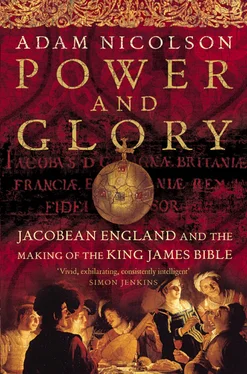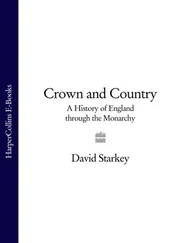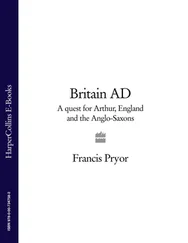Little, crumpled Robert Cecil, âmy elf, my beagle, my pygmyâ, as James would part affectionately, part humiliatingly call him (Elizabeth had used the same tease-taunts), with his pale, almond-shaped face, his stooped figure, his evaluating eyes, guided the king around the stupendous palace: the hall decorated with the signs of the Zodiac, where the stars shone at night and which a mechanical sun traversed by day; another hall containing a painted map of England showing all the cities, towns and villages, as well as âthe armorial bearings and domains of every esquire, lord, knight and noble who possess lands and retainers to whatever extentâ. There was an open loggia in which the whole history of England was painted on the walls. In the Long Gallery were portraits of all the great men there had ever been. There were pleasure gardens. There were pictures of all the cities of Christendom. Life can never have seemed so rich. Cecil loved toys and rarities of all kinds, from tortoise-shaped clocks to the ânests of little boxes of Chinaâ and the âcabinet of china gilt all overâ which were among his possessions at his death. He paid for lion cubs to be trained up in the Tower of London as pets for the king. He had a tame parrot which drank red wine from Bordeaux and walked up and down his dinner table making âhis choice of meatâ. After taking its fill, the bird used to sit âin a gentlewomanâs ruff all dayâ.
The troubled and difficult soul of James Stuart, for so long exposed to parsimony, betrayal and violence in his native Scotland, had arrived in a world of marvels, as if England was a cabinet of rarities to which he had at last been given the key. He immediately elevated Robert Cecil to the peerage (and the following year made him Earl of Salisbury) the first of the fifty-six baronies, nineteen viscountcies, thirty-two earldoms, one marquisate and three dukedoms which James scattered like sequins across the country. The bridegroom was in the full and expansive flush of his honeymoon (Jamesâs own comparison) and England, the heiress he had married, was happy for the moment to walk alongside him, glowing with the riches she had brought him.
TWO The multitudes of people covered the beautie of the fields
And the mixt multitude that was among them fell a lusting: and the children of Israel also wept againe, and said, Who shall giue vs flesh to eate?
We remember the fish, which wee did eate in Egypt freely: the cucumbers and the melons, and the leekes, and the onions, and the garlicke. [â¦]
And while the flesh was yet betweene their teeth, yer [ere] it was chewed, the wrath of the LORD was kindled against the people, and the LORD smote the people with a very great plague.
And he called the name of that place Kibroth-hattaavah * : because there they buried the people that lusted.
Numbers 11:4â5, 33â34
Iames finally moved on from the enveloping luxuries of Theobalds and arrived at London on 7 May. He found a city full of flowers. James Nasmyth, who was to become chief surgeon to the king, had at last persuaded one of his Persian black fritillaries to bloom. He had seen a printed illustration, he had the bulbs from what he considered a good source, and now at last its dark plum-coloured pagoda of hanging heads was up and mysteriously beautiful in his Long Acre garden. Robert Cecil himself had a garden he treasured next to his house on the Strand, shaded with lime trees and where tulips from Crete and Turkey, globe flowers from the Peloponnese and American yuccas all grew. In the greenhouses, the artichokes, melons and cucumbers were coming on. The lambâs lettuce, endives, rocket, marigolds, orache, spinach, chervil and rampion were all out, planted in the beds. Some of the more advanced gardeners were experimenting with the bitter leaves of chicory, known then as lattuca romana . Horse radish was grown as an ingredient for fish sauce along with both Spanish and sweet Virginian potatoes. Cauliflower was a rarity; it was difficult to get seed that would germinate.
Even London, by far the biggest city in England, and on its way to becoming the biggest in Europe, over which on bad days a smog of coal smoke already hung, was still rural in its corners. The swallows were returning from the winter they had spent, as everyone knew, deep in the Cornish tin mines. Barnacle geese were breeding âunderwater on such ships sides as have beene verie long at seaâ. And with the coming of the spring the botanists examined the London plants. Timothy, the lovely early fox-tailed grass, was found âon the upland meadows between Islington and Highgateâ. Royal ferns were growing in a bog on Hampstead Heath. There was meadow saxifrage in Grayâs Inn Lane, and the strange, weedy prickly lettuce on a high bank by the footpath next to it. The dark leaves and pink flowers of marsh woundwort, which helped to heal cuts and grazes, was growing next to the paths that led out to the villages of Kensington and Chelsea and in a small patch in Westminster near the Thames. On the abbey itself, the little yellow-spired herb called pennywort, a native of rocks and cliffs, now found only in Cornwall and the far west, grew over the door next to Chaucerâs tomb, which led out on the path to the old palace.
Around these delicacies â and you could still get a cup of milk and a pot of clotted cream from the dairy farm just north of the city walls â London swelled and bubbled. The holiday atmosphere lasted for a while after James had reached the city. As he made his way through the suburbs, where the houses and tenements had crept out in a wide rash beyond the medieval walls, the crowds had been enormous, and as one observer who went out to see the king described it, âthe multitudes of people in highwayes, fieldes, meadowes, and on trees, were such that they covered the beautie of the fieldesâ. Hats were thrown in the air. People were killed in the crush. It was said by the Venetian Ambassador, perhaps believably, that 40,000 strangers and visitors had surged into London around the new court; its normal population was about 140,000. By the time James and his queen were crowned in July, the number of visitors had ballooned to an extraordinary 100,000. A new king, a time of flux, was an opportunity not to be passed up. Letters arrived from the kings and princes of Christendom. The spreading beneficence continued. Ancient Catholic priests and one or two enemies of the Elizabethan establishment were all released from the Tower. The sun was shining.
Along with the crush of new suitors at the court came another, less welcome visitor. In its shadow the King James Bible came into being. By the end of May, the Council, in the kingâs name, had already issued a royal proclamation that âGentlemen were to depart the Courtâ, for âwe find the sicknesse already somewhat forward within our City of London, which by concourse of people abiding there is very like to be increasedâ.
There had been 112 deaths in London that week, thirty of them from the plague. This outbreak had slid in from the East, making its way across Europe from the steppes of Eurasia, first touching England in the east coast ports in 1602. With the gathering of people at the accession of a new king (it would happen again at the accession of Charles I in 1625, an ominous start to a pair of Stuart reigns), plague would almost inevitably strike the capital. London, or at least the poor and dirty parts of it, were a perfect breeding ground. By 23 June, in that week alone, London plague deaths were up to 158. By the end of the year the total would have reached 30,000.
Disease exposes the assumptions of a society, and this ferocious outbreak of the plague throws the nature of Jacobean England into sudden highlight. People felt they understood the plague. It was a moral affliction which attacked cities because cities were wicked and disgusting. London was a sucking sink of iniquity, with something murderous and dissolving at its core. Disintegrating medieval palaces and abandoned monastic houses lay about the city like scavenged animals. Next to these half-rotting corpses, there was a strange and disturbing intensity, the product of a new and bewildering urge to cluster at the commercial centre of England. London was stretching, groaning, falling apart with its own growth. The open spaces which had brought air into the medieval city were filled with new buildings. All its sustenance was dragged in from the surrounding countryside, which for miles around had become one vast market garden. Fewer than half the houses in London had their own kitchen and almost none their own oven. It was a fast-food city, mutton pasties and fruit pies available at street stands; early asparagus would be there in season, swathed in butter. Tavern-keepers provided free âthincut slices of roast-beef on the barâ, heavily dosed with salt to increase customersâ thirst. Everything was for sale: the title of Thomas Middletonâs A Chaste Maid in Cheapside , which was first performed in 1613, was a joke. There was no such thing.
Читать дальше












